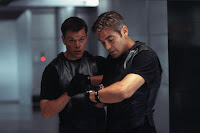So, Booboo, this week’s title has two references. One’s pop culture, of course, but the other one hearkens way, way back to an article I read in Writer’s Digest when I was in my first year of college. This was when we were between sessions of the Continental Congress.
This is going to be a bit vague at first, so please forgive me.
The man contributing the article was a writer on a sitcom, and his boss had tossed one of his scripts back at him with the words “You have to earn the right to use the bear suit.” When the baffled writer asked for an explanation, he was told this story. I believe it was a Honeymooners episode in the original telling, but I’m not sure so I’m going to substitute in characters from another sitcom as I tell it to you. Trust me, it won’t make a difference…
So, Yakko, Wakko, and Dot decide they’re going to go camping up in the mountains. But Dot’s been a bit uppity lately so Yakko and Wakko come up with an idea. They get a grizzly bear suit and stash it in the car. When they get up there, Yakko will sneak away and put the costume on, then “attack” the campsite. Wakko will play along, Dot will get a good scare and get her comeuppance. Loads of fun.
Well, they get up to the campsite and Yakko heads into the woods with the costume, but he gets lost and can’t find his way back. Meanwhile, a real grizzly ends up wandering into camp and rummaging around. Dot is petrified and Wakko decides to have some fun with “Yakko” by making it seem like the bear is–
Look, do I really need to explain this any further? You’ve all seen this story at least a hundred times, yes? It was such a well-received gag everybody copied it. And continued to copy it. And they’re still doing it today.
The bear suit is a tired gag. It’s a cliché. It’s something we’ve all seen again and again and again and again, in books, comics, television shows, and movies. The two identical characters that confuse people. The funny new catchphrase or non-sequitor reference. The insane villain. The character who gets amnesia or loses their superpowers. All of these are things people have seen so many times they’ve gone past yawning and just roll their eyes.
Oftentimes, the bear suit is the path of least resistance. It’s the easiest way to deal with a need or problem in the writer’s story and the quickest way to create an obstacle. And a lot of people tend to jump at the first solution they can find, rather than look for the best solution.
And that’s really the problem. Since so many people jump at the bear suit, it’s common. It’s dull. Editors and producers have seen it a hundred times this month alone. If they’re going through your work and they find that dusty old thing laying around, your manuscript instantly goes into the big pile on the left.
Let’s try a little exercise. Here are three pretty standard plot devices.
–Two high schoolers get left alone in their palatial home when their parents go away for a week.
–Six teenagers head off into the woods to restore the old summer camp by the lake.
–A man completely focused on his career has to spend a long weekend with a flighty blonde who loves animals.
You probably got an immediate idea off each one. If your first thoughts were throw a wild party, get picked off by a serial killer, and fall in love, don’t feel too bad. What matters is where you go from there. Toss out that first thought and come up with another one. Then toss that one and come up with a third. Toss it again and scribble down a fourth.
Y’see, Timmy, this is one of those complicated points of writing where it’s hard to give a guideline. Often, when you’re writing, you want to go with your gut. You want your words to be honest and not have a lot of analysis and formulae and overthinking behind them.
At the same time, however, you want to be careful about going with your first thoughts, because odds are they’re a lot of other people’s first thoughts, too. This is also why serious writers have to read a lot, and why serious screenwriters need to see a lot of movies. If you don’t know what’s out there, you might already have the bear suit on and not even know it. Heck, yours may be completely moth-eaten and you think it’s going to scare someone in the woods.
Now, here’s the catch. As I mentioned above, you can earn the right to use the bear suit. If you’ve already got a solid track record, if everything around it is gold (or at least well-polished silver), every now and then you can get away with using the old gag. Christopher Priest used one of the most tired ideas in literature for the ending of The Prestige, but did it so well it still blew people away. Stephen King took the tired idea of the Indian burial ground and then took it past the first or second idea to very creepy and popular third idea.
Again though– that’s the exception, not the rule. If you want to do this writing thing for real, your first decision can’t be to reach for the bear suit.
Next week, I’m finally going to do a Michael Jackson memorial pop culture reference. I would’ve done one sooner but, well… I didn’t care that much.
Oh, and if you’ve got a few dollars to spare, I have been gently jabbed by mine editor to shamelessly remind you all Cthulhu Unbound 2 is now for sale. Check out the Amazon link over there on the side, pick it up, and feel free to mock my contribution to it.
And even if you buy it, shipping means you’ll still have time to go write this week.
So get to it.
 Buffy Summers doesn’t receive her Slayer calling because the Master is rising in Sunnydale—the last Slayer died and she inherited the power. That’s it.
Buffy Summers doesn’t receive her Slayer calling because the Master is rising in Sunnydale—the last Slayer died and she inherited the power. That’s it.





